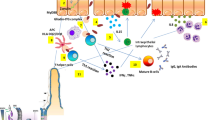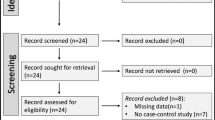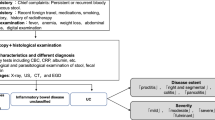Abstract
Background
Toll-like receptor (TLR) polymorphisms, and especially TLR-4 Asp299Gly and TLR-4 Thr399Ile, have been linked with Crohn’s disease (CD) and to a lesser extent with ulcerative colitis (UC), CD behavior, and compromised seroreactivity to microbial antigens. Available data, however, are conflicting.
Aims
To address these issues, the distribution of TLR-4 polymorphic alleles was assessed in patients with UC, CD, and healthy controls (HC), considering patient and disease characteristics as well as related serological markers.
Methods
TLR-4 Asp299Gly and TLR-4 Thr399Ile polymorphisms were determined in 187 UC and 163 CD patients and 274 randomly selected HC. C reactive protein, anti-Saccharomyces cerevisiae mannan antibodies, anti-mannobioside carbohydrate antibodies, anti-laminariobioside carbohydrate antibodies IgG, and anti-chitobioside carbohydrate antibodies (ACCA) IgA levels were also assessed.
Results
UC and especially pancolitis patients carried the mutant alleles more frequently compared to CD patients and HC or UC patients with different disease extents (P = 0.002 and P < 0.0001, respectively). Involvement of the colon was more frequent in CD patients with mutant TLR-4 compared to those with wild-type alleles (P = 0.004). Levels and positivity rates of ACCA IgA were lower in inflammatory bowel disease (IBD) patients carrying the mutant compared to those with wild-type alleles (0.075 < P < 0.05). Despite the mutant TLR-4 predisposition for UC pancolitis, smoking was associated with more limited disease (P < 0.001).
Conclusions
The presence of TLR-4 Asp299Gly and TLR-4 Thr399Ile polymorphisms is related to UC pancolitis, involvement of the colon in CD, and lower ACCA IgA levels. Smoking reduces the extent of UC, even in the presence of mutant alleles.





Similar content being viewed by others
References
Baumgart DC. What’s new in inflammatory bowel disease in 2008? World J Gastroenterol. 2008;14:329–330.
Rodriguez-Bores L, Fonseca GC, Villeda MA, et al. Novel genetic markers in inflammatory bowel disease. World J Gastroenterol. 2007;13:5560–5570.
Franchimont D, Vermeire S, El Housni H, et al. Deficient host-bacteria interactions in inflammatory bowel disease? The Toll-like receptor (TLR)-4 Asp299Gly polymorphism is associated with Crohn’s disease and ulcerative colitis. Gut. 2004;53:987–992.
Torok HP, Glas J, Tonenchi L, et al. Polymorphisms of the lipopolysaccharide-signaling complex in inflammatory bowel disease: association of a mutation in the Toll-like receptor 4 gene with ulcerative colitis. Clin Immunol. 2004;112:85–91.
De Jager PL, Franchimont D, Waliszewska A, et al. The role of the toll receptor pathway in susceptibility to inflammatory bowel diseases. Genes Immun. 2007;8:387–397.
Browning BL, Huebner C, Petermann I, et al. Has Toll-like receptor 4 been prematurely dismissed as an inflammatory bowel disease gene? Association study combined with meta-analysis shows strong evidence for association. Am J Gastroenterol. 2007;102:2504–2512.
Brand S, Staudinger T, Schnitzler F, et al. The role of Toll-like receptor 4 Asp299Gly and Thr399Ile polymorphisms and CARD15/NOD2 mutations in the susceptibility and phenotype of Crohn’s disease. Inflamm Bowel Dis. 2005;11:645–652.
De Ridder L, Weersma RK, Dijkstra G, et al. Genetic susceptibility has a more important role in pediatric-onset Crohn’s disease than in adult-onset Crohn’s disease. Inflamm Bowel Dis. 2007;19:317–320.
Braat H, Stokkers P, Hommes T, et al. Consequence of function Nod2 and Tlr4 mutations on gene transcription in Crohn’s disease patients. J Mol Med. 2005;83:601–605.
Fries W, Renda MC, Lo Presti MA, et al. Intestinal permeability and genetic determinants in patients, first-degree relatives, and controls in a high-incidence area of Crohn’s disease in Southern Italy. Am J Gastroenterol. 2005;100:2730–2736.
Hume GE, Fowler EV, Doecke J, et al. Novel NOD2 haplotype strengthens the association between TLR4 Asp299gly and Crohn’s disease in an Australian population. Inflamm Bowel Dis. 2008;14:585–590.
Oostenbrug LE, Drenth JP, de Jong DJ, et al. Association between Toll-like receptor 4 and inflammatory bowel disease. Inflamm Bowel Dis. 2005;11:567–575.
Ouburg S, Mallant-Hent R, Crusius JB, et al. The Toll-like receptor 4 (TLR4) Asp299Gly polymorphism is associated with colonic localization of Crohn’s disease without a major role for the Saccharomyces cerevisiae manna-LBP-CD14-TLR4 pathway. Gut. 2005;54:439–440.
Baumgart DC, Buning C, Geerdts L, et al. The c.1-260C>t promoter variant of CD14 but not the c.896A>G (p.D299G) variant of Toll-like receptor 4 (TLR4) genes is associated with inflammatory bowel disease. Digestion. 2007;76:196–202.
Lakatos PL, Altorjay I, Szamosi T, et al. Pancreatic autoantibodies are associated with reactivity to microbial antibodies, penetrating disease behavior, perianal disease, and extraintestinal manifestations, but not with NOD2/CARD15 or TLR4 genotype in a Hungarian IBD cohort. Inflamm Bowel Dis. 2009;15:365–374.
Arnott ID, Ho GT, Nimmo ER, et al. Toll-like receptor 4 gene in IBD: further evidence for genetic heterogeneity in Europe. Gut. 2005;54:308.
Rigoli L, Romano C, Caruso RA, et al. Clinical significance of NOD2/CARD15 and Toll-like receptor 4 gene single nucleotide polymorphisms in inflammatory bowel disease. World J Gastroenterol. 2008;14:4454–4461.
Hong L, Leung E, Fraser AG, et al. TLR2, TLR4 and TLR9 polymorphisms and Crohn’s disease in a New Zealand Caucasian cohort. J Gastroenterol Hepatol. 2007;22:1760–1766.
Henckaerts L, Pierik M, Joossens M, et al. Mutations in pattern recognition receptor genes modulate seroreactivity to microbial antigens in patients with inflammatory bowel disease. Gut. 2007;56:1536–1542.
Ferwerda B, McCall MB, Verheijen K, et al. Functional consequences of toll-like receptor 4 polymorphisms. Mol Med. 2008;14:346–352.
Ferwerda B, McCall MB, Alonso S, et al. TLR4 polymorphisms, infectious diseases, and evolutionary pressure during migration of modern humans. Proc Natl Acad Sci USA. 2007;104:16645–16650.
Apetoh L, Ghiringhelli F, Tesniere A, et al. Toll-like receptor 4-dependent contribution of the immune system to anticancer chemotherapy and radiotherapy. Nat Med. 2007;13:1050–1059.
Kim JJ, Sears DD. TLR4 and insulin resistance. Gastroenterol Res Pract. 2010. Available at http://www.hindawi.com/journals/grp/2010/212563. Accessed January 5, 2012.
Shen X, Shi R, Zhang H, et al. The Toll-like receptor 4 D299G and T399I polymorphisms are associated with Crohn’s disease and ulcerative colitis: a meta-analysis. Digestion. 2010;81:69–77.
Cario E. Toll-like receptors in inflammatory bowel diseases: a decade later. Inflamm Bowel Dis. 2010;16:1583–1597.
Best WR, Becktel JM, Singleton JW, et al. Development of a Crohn’s disease activity index. National Cooperative Crohn’s Disease Study. Gastroenterology. 1976;70:439–444.
Rachmilewitz D. Coated mesalazine (5-aminosalicylic acid) versus sulphasalazine in the treatment of active ulcerative colitis: a randomised trial. BMJ. 1989;298:82–86.
Gasche C, Scholmerich J, Brynskov J, et al. A simple classification of Crohn’s disease: report of the working party for the world congresses of gastroenterology, Vienna 1998. Inflamm Bowel Dis. 2000;6:8–15.
Silverberg MS, Satsangi J, Ahmad T, et al. Toward an integrated clinical, molecular and serological classification of inflammatory bowel disease: report of a working party of the 2005 Montreal world congress of gastroenterology. Can J Gastroenterol. 2005;19:5–36.
Satra M, Vamvakopoulou DN, Sioutopoulou DO, et al. Sequence-based genotyping HPV L1 DNA&RNA transcripts in clinical specimens. Pathol Res Pract. 2009;205:863–869.
Eckmann L. Innate immunity. In: Johnson LR, Barrett KE, Ghishan FK, eds. Physiology of the gastrointestinal tract, vol. 2. Amsterdam: Elsevier; 2006:1033–1066.
Arseneau KO, Tamagawa H, Pizzaro TT, et al. Innate and adaptive immune responses related to IBD pathogenesis. Cur Gastroenterol Rep. 2007;9:508–512.
Hadley C. Should auld acquaintance be forgot. EMBO Rep. 2004;5:1122–1124.
Himmel ME, Hardenberg G, Piccirillo CA, et al. The role of T-regulatory cells and Toll-like receptors in the pathogenesis of human inflammatory bowel disease. Immunology. 2008;125:145–153.
Fukata M, Abreu MT. TLR4 signalling in the intestine in health and disease. Biochem Soc Trans. 2007;35:1473–1478.
Torchinsky MB, Garaude J, Martin AP, et al. Innate immune recognition of infected apoptotic cells directs T(H)17 cell differentiation. Nature. 2009;458:78–82.
Fukata M, Chen A, Klepper A, et al. Cox-2 is regulated by Toll-like receptor-4 (TLR4) signaling: role in proliferation and apoptosis in the intestine. Gastroenterology. 2006;131:862–877.
Rakoff-Nahoum S, Paglino J, Eslami-Varzaneh F, et al. Recognition of commensal microflora by Toll-like receptors is required for intestinal homeostasis. Cel. 2004;118:229–241.
Fukata M, Michelsen KS, Eri R, et al. Toll-like receptor-4 is required for intestinal response to epithelial injury and limiting bacterial translocation in a murine model of acute colitis. Am J Physiol Gastrointest Liver Physiol. 2005;288:G1055–G1065.
Ali S, Tamboli CP. Advances in epidemiology and diagnosis of inflammatory bowel diseases. Cur Gastroenterol Rep. 2008;10:576–584.
Rallabhandi P, Bell J, Boukhvalova MS, et al. Analysis of TLR4 polymorphic variants: new insights into TLR4/MD-2/CD14 stoichiometry, structure, and signaling. J Immunol. 2006;177:322–332.
Prohinar P, Rallabhandi P, Weiss JP, et al. Expression of functional D299G. T399I polymorphic variant of TLR4 depends more on coexpression of MD-2 than does wild-type TLR4. J Immunol. 2010;184:4362–4367.
Manolakis AC, Kapsoritakis AN, Tiaka EK, et al. Impact of TLR-4 polymorphisms on circulating levels of antibodies against Helicobacter pylori. Helicobacter. 2010;15:481–482.
Frolova L, Drastich P, Rossmann P, et al. Expression of Toll-like receptor 2 (TLR2), TLR4, and CD14 in biopsy samples of patients with inflammatory bowel diseases: upregulated expression of TLR2 in terminal ileum of patients with ulcerative colitis. J Histochem Cytochem. 2008;56:267–274.
Deng J, Ma-Krupa W, Gewirtz AT, et al. Toll-like receptors 4 and 5 induce distinct types of vasculitis. Circ Res. 2009;104:488–495.
Liu Y, Zhang Z, Wang L, et al. TLR4 monoclonal antibody blockade suppresses dextran-sulfate-sodium-induced colitis in mice. J Gastroenterol Hepatol. 2010;25:209–214.
Ungaro R, Fukata M, Hsu D, et al. A novel Toll-like receptor antagonist antibody ameliorates inflammation but impairs mucosal healing in murine colitis. Am J Physiol Gastrointest Liver Physiol. 2009;296:G1167–G1179.
Savoye G, Lerebours E. Toll-Like Receptor-4 signaling: a possible candidate pathway to support tobacco smoking effects in ulcerative colitis. Am J Gastroenterol. 2008;103:2947–2948.
Bessa J, Bachmann MF. T cell-dependent and -independent IgA responses: role of TLR signaling. Immunol Invest. 2010;39:407–428.
Abreu M. Toll-like receptor signaling in the intestinal epithelium: how bacterial recognition shapes intestinal function. Nat Rev Immunol. 2010;10:131–134.
Heimesaat MM, Fischer A, Siegmund B, et al. Shift towards pro-inflammatory intestinal bacteria aggravates acute murine colitis via Toll-like receptors 2 and 4. PLoS ONE. 2007;2:e662.
Heimesaat MM, Fischer A, Jahn HK, et al. Exacerbation of murine ileitis by Toll-like receptor 4 mediated sensing of lipopolysaccharide from commensal Escherichia coli. Gut. 2007;56:941–948.
McCarthy MI, Zeggini E. Genome-wide association studies in type 2 diabetes. Curr Diab Rep. 2009;9:164–171.
McCarthy MI, Hirschhorn JN. Genome-wide association studies: past, present and future. Hum Mol Genet. 2008;17:R100–R101.
Acknowledgments
The authors would like to thank Dr. Maria Satra for expert technical assistance and Dr. Georgios Nasioulas for sequence analysis of clinical specimens. Grant support for the current project was offered by the Hellenic Society of Gastroenterology.
Conflict of interest
None.
Author information
Authors and Affiliations
Corresponding author
Rights and permissions
About this article
Cite this article
Manolakis, A.C., Kapsoritakis, A.N., Kapsoritaki, A. et al. Readressing the Role of Toll-Like Receptor-4 Alleles in Inflammatory Bowel Disease: Colitis, Smoking, and Seroreactivity. Dig Dis Sci 58, 371–380 (2013). https://doi.org/10.1007/s10620-012-2348-4
Received:
Accepted:
Published:
Issue Date:
DOI: https://doi.org/10.1007/s10620-012-2348-4




